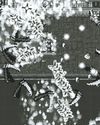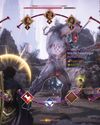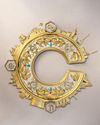
Deep in the frozen city of Irithyll there’s a candlelit ballroom hung with gilt-framed paintings. One in particular holds our gaze as we enter from the kitchen below, and not just because there’s a Silver Knight standing by it, gazing at the brushwork. It shows a majestic, reclining woman with golden hair, wearing white. The oils are faded, but her gentle expression is visible over the enemy’s shoulder.
As we approach cautiously, our impulse to stab the knight in the back struggles against a feeling of shared nostalgia and reverence. For this is no mortal woman, but Gwynevere, Princess Of Sunlight, one of the fire gods of Anor Londo – capstone of the original Dark Souls world. Other paintings depict locations from the first game, along with Dark Souls II’s Drangleic, giving the room the character of an Easter egg gallery sealed off from the terrors outside. But much like the Gwynevere of old, these images exist to deceive. As we cross the midpoint there’s a mocking creak, and we’re struck from behind by an arrow the size of a spear. It’s a testament to the staging that we still fall victim to this ruse on returning to Dark Souls III, five years after we first played it.
Esta historia es de la edición January 2022 de Edge.
Comience su prueba gratuita de Magzter GOLD de 7 días para acceder a miles de historias premium seleccionadas y a más de 9,000 revistas y periódicos.
Ya eres suscriptor ? Conectar
Esta historia es de la edición January 2022 de Edge.
Comience su prueba gratuita de Magzter GOLD de 7 días para acceder a miles de historias premium seleccionadas y a más de 9,000 revistas y periódicos.
Ya eres suscriptor? Conectar

BONAPARTE: A MECHANIZED REVOLUTION
No sooner have we stepped into the boots of royal guard Bonaparte than we’re faced with a life-altering decision.

TOWERS OF AGHASBA
Watch Towers Of Aghasba in action and it feels vast. Given your activities range from deepwater dives to climbing up cliffs or lumbering beasts, and from nurturing plants or building settlements to pinging arrows at the undead, it’s hard to get a bead on the game’s limits.

THE STONE OF MADNESS
The makers of Blasphemous return to religion and insanity

Vampire Survivors
As Vampire Survivors expanded through early access and then its two first DLCs, it gained arenas, characters and weapons, but the formula remained unchanged.

Devil May Cry
The Resident Evil 4 that never was, and the Soulslike precursor we never saw coming

Dragon Age: The Veilguard
With Dragon Age: The Veilguard, BioWare has made a deeply self-conscious game, visibly inspired by some of the best-loved ideas from Dragon Age and Mass Effect.

SKATE STORY
Hades is a halfpipe

SID MEIER'S CIVILIZATION VII
Firaxis rethinks who makes history, and how it unfolds

FINAL FANTASY VII: REBIRTH
Remaking an iconic game was daunting enough then the developers faced the difficult second entry

THUNDER LOTUS
How Spirit farer's developer tripled in size without tearing itself apart